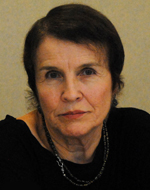Vaccination makes conquering COVID possible
With unity comes progress
|
|
|
Roberta Lynch |
The only thing we have to fear is fear itself. Those were the words of President Franklin Delano Roosevelt as he urged Americans to come together to overcome the devastation wrought by the Great Depression, with an economy in tatters and millions unemployed.
The coronavirus pandemic we confront today may represent an even greater peril for our country than did the Depression of the 1930s. It has killed more Americans than were lost in all of World War II, left tens of thousands with lingering health complications and crippled our economy.
As we are once again called to unite to defend our nation—this time from a ferocious viral invader—the words of President Roosevelt point directly to what is again the greatest barrier to victory: fear itself.
Fear is, in fact, a natural human reaction. There are few among us with the unalloyed courage to rush headlong to meet every new challenge without a moment of hesitation. Most of us will waver, freeze or even flee when confronted with the novel or unfamiliar, whether it’s merely as unsettling as first learning to swim or as risk-ridden as fighting in an armed conflict.
But all of human progress is about conquering our fears, summoning the courage to move forward for ourselves and for the greater good.
When the coronavirus first arrived in our midst, many union members were rightly afraid to do their jobs as rates of infection quickly soared. Our union immediately went to work to learn, educate and act in order to make workplaces safer and help members push through their fears.
Now we are facing a new unknown, one that has prompted new fears even as it offers the promise of defending against the virus. COVID vaccinations are the most potent weapon we have in the battle to reduce the transmission of the coronavirus and begin to restore so much of what we value in our daily lives: Gatherings with friends and family, vacation travels, kids in their classrooms, high school sports with crowded bleachers, dinners at restaurants and drinks at bars, hugs freely given, and yes, kisses too. Most fundamentally, it’s the path to economic renewal and restoring jobs to those who have lost them.
Yet despite this immense social benefit, some frontline workers are refusing to be vaccinated, fearful of this new unknown. And as long as those fears prevail, we will remain vulnerable to this dangerous virus.
For many, especially younger people, COVID-19 is no more than a few days of mild to extreme discomfort—chills, weakness, fatigue. But for many others, it is something closer to agony—great difficulty in breathing, extreme weakness, brain fog. For some, it is weeks, even months, in the hospital, unable to visit with family, unable to breathe without oxygen, or unable to survive without being on a ventilator. And then, tragically, there are those for whom COVID-19 is a death sentence, often to a slow, painful and lonely death.
COVID cannot be defeated unless our fears can be overcome. Skepticism and concern are natural. But the fact is the vaccines have been proven safe and effective. Every study, every phase, every trial was reviewed by the FDA and a safety board of medical and scientific experts. And millions of our fellow Americans have already been vaccinated with only a handful of serious adverse reactions.
That’s why our union is now working to ensure the safety of all members by educating every member about the very low risks and the very significant benefits—for ourselves and for our country—of being vaccinated against COVID. Time and again, those who came before us—be they great grandparents who crossed oceans, the early settlers on new frontiers, soldiers going into battle, civil rights activists fighting for human dignity, or workers who braved goons and guns to form the first unions—faced down their fears and moved our nation forward.
The question now before us is powerful and real: Can we do any less?




